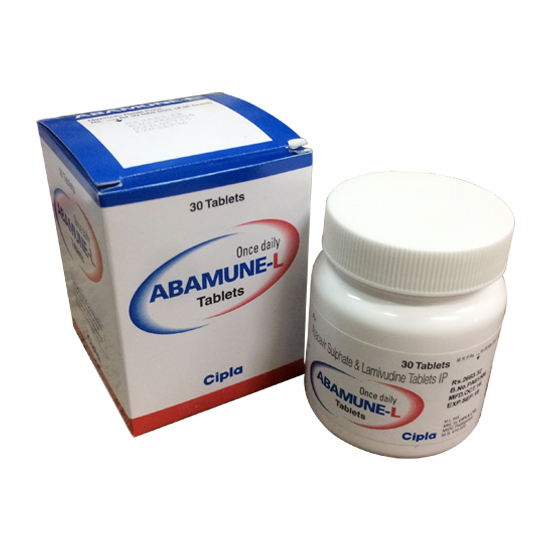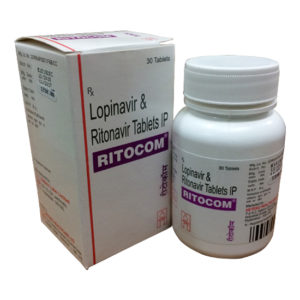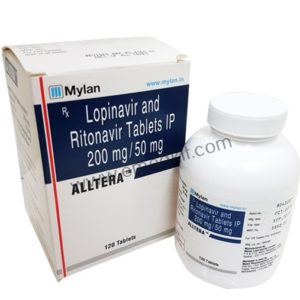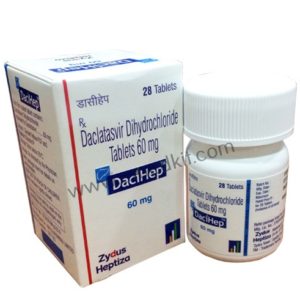Abamune-L general information
What is Abamune-L used for?
Abamune-L tablets 600mg/300mg is a combination of two medications, abacavir and lamivudine which belong to a class of medicines called antiretrovirals. They are used together with other antiretrovirals to slow down the progression of HIV infection (human immunodeficiency virus), which can lead to AIDS (Acquired Immune Deficiency Syndrome) and other related illnesses for example, AIDS – related Complex or ARC.
How does Abamune-L work?
The two medications abacavir and lamivudine combined together help prevent HIV from reproducing. The HIV virus is responsible for acquired immune deficiency syndrome as HIV infection destroys CD4 (T) cells, which are important to the body’s immune system. The immune system is what helps fight infections. Abamune-L tablets do not cure AIDS or destroy the HIV virus, but rather delay further damage to the immune system by stopping production of new viruses. Abamune-L tablets do not reduce the risk of passing infection to others. It is important that you continue to take precautions to prevent this from happening as the HIV virus can still be passed on by sexual activity or by contamination with infected blood.
What does Abamune-L contain?
Abamune-L tablets contain the active ingredients, abacavir 600mg and lamivudine 300mg, which are nucleoside reverse transcriptase inhibitors. Reverse transcriptase is a component of HIV required to infect cells so that more virus can be produced, however abacavir and lamivudine prevent transcriptase from functioning properly. Abamune-L tablets also contain the following inactive ingredients: magnesium stearate, microcrystalline cellulose, sodium starch glycollate.
What are the side effects of Abamune-L?
Abamune-L tablets can cause some side effects. If they do occur and some may be serious, seek medical advice from your health professional as you may require medical attention. As Abamune-L tablets contain both abacavir and lamivudine, the side effects reported for each of these have been combined. It has been reported that the most common side effects which could affect at least one to ten in every 100 people include nausea, vomiting, diarrhoea, upper abdominal pain, headache, high temperature, lethargy, fatigue, loss of appetite, hair loss, joint and muscle pain, abacavir hypersensitivity and skin rash. Less common side effects which could affect less than 1 in every 100 people include increased liver enzyme production, anaemia (low red blood cell count), neutropenia (low white blood cell count), reduced number of blood cells important for blood clotting.
You may show symptoms of tiredness or breathlessness if the production of red blood cells is reduced. A reduction in your white blood cell count can make you more susceptible to infection.
Rare side effects which could affect less than one in every 1000 people are breakdown of muscle tissue, increases of an enzyme called amylase and inflammation of the pancreas. Very rare side effects which could affect less than one in every 10,000 people are serious skin reactions and severe anaemia. It has been documented that any changes in fat distribution are associated with antiretroviral medications, which may include loss of fat from legs, arms and face and also increased fat in the abdomen and other internal organs, breasts and the back of the neck. Changes in the amount of fatty substances and glucose in the blood have also been reported. Within the first few weeks of commencing treatment with anti-HIV medicines, some people and in particular those that have been HIV positive for some time, may develop inflammatory reactions for example, pain, redness, swelling and high temperature which may resemble an infection and may be severe. If you notice any changes in your health after commencing HIV treatment or become concerned with any new symptoms, then it is advisable you discuss this with your medical professional immediately. If you experience any of the following, call your doctor immediately. Lactic Acidosis – if you become very sick with accelerated breathing, you may have a condition known as this. High acid levels in the blood can cause rapid breathing and be life threatening. This is more common in women than men. If you experience allergic reactions soon after starting Abamune-L medication, for example wheezing, any swelling of the lips/mouth, difficulty in breathing, hay fever, hives or fainting then call your doctor immediately. Like all medications, there may be other side effects that occur in some people that are not listed or some side effects that are not yet known.
How should Abamune-L be taken?
Abamune-L tablets should be swallowed whole with a glass of water. You do not have to take this medication with food.
How much Abamune-L should I take?
Take Abamune-L tablets as directed by your medical professional. The normal dose for adults and adolescents is one tablet once daily, however your medical professional may prescribe differently.
What to do if I take too much Abamune-L
You may need urgent medical attention if you have exceeded your recommended dosage. Even if you display no signs of discomfort or poisoning, it is advisable you call your doctor immediately.
Missed dose of Abamune-L
If you have forgotten to take your recommended dose, take it as soon as you remember and then continue as you normally would. Do not take more than one tablet to make up for the doses you have missed.
How long should Abamune-L be taken for?
Abamune-L helps to control your condition. It does not cure it, however you will need to take your recommended dosage every day. Do not stop taking your Abamune-L tablets or alter the dose without consulting with your medical professional.
How should Abamune-L tablets be stored?
It is important you keep this medication safely out of reach of children. Keep Abamune-L tablets stored in a cool, dry place below 25°C.













Reviews
There are no reviews yet.